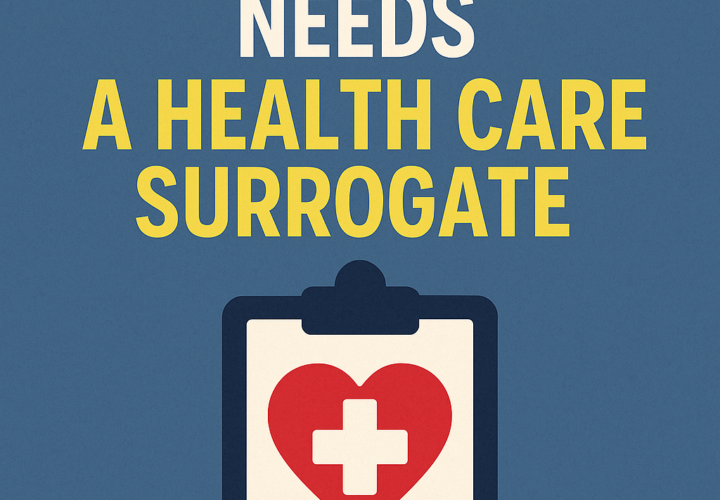Understanding the Right Medical Decision-Making Document in Florida
Planning for the future includes more than just financial decisions—it also involves ensuring your medical preferences are honored if you are unable to communicate them yourself. In Florida, individuals can use either a Healthcare Power of Attorney (POA) or a Designation of Health Care Surrogate to legally appoint someone to make medical decisions on their behalf. While Florida law recognizes both documents, the Designation of Health Care Surrogate is often preferred because it provides broader authority and aligns more closely with Florida’s healthcare decision-making framework.
If you want to ensure that your advance directives, medical decisions, and end-of-life care preferences are honored, understanding how a Health Care Surrogate works and how it compares to a Healthcare Power of Attorney is crucial. This guide will explain the differences between these two documents, clarify why a Health Care Surrogate is generally preferred in Florida, and help you determine the best approach for protecting your healthcare wishes.
Florida Law: Healthcare Power of Attorney vs. Health Care Surrogate
Unlike many states that recognize a Healthcare Power of Attorney as the primary medical decision-making document, Florida law places greater emphasis on the Designation of Health Care Surrogate. However, Florida does recognize Healthcare Power of Attorney documents if they were validly executed in another state. If someone moves to Florida with an existing Healthcare POA, it will be honored if it was validly executed in another state. However, it is a good practice to review its validity and ensure it aligns with current healthcare needs. In some cases, updating to a Health Care Surrogate designation may provide more clarity and better align with Florida law.
Why Florida Prefers a Health Care Surrogate Over a Medical POA
- The Health Care Surrogate designation automatically includes HIPAA authorization, allowing the surrogate access to medical records.
- This document can be effective immediately or only upon incapacitation, depending on how it is written.
- It allows the surrogate to act as a medical advocate, ensuring that advance directives (such as living wills and Do Not Resuscitate (DNR) orders) are honored.
- Without a designated surrogate, family members may need to seek court approval to make medical decisions, leading to delays in critical healthcare situations.
For assistance in setting up a Health Care Surrogate in Sarasota, visit Scovills’ Health Care Surrogate Services.
What is a Health Care Surrogate?
A Health Care Surrogate is a trusted person you legally appoint to make medical decisions on your behalf if you become unable to do so. This document allows you to outline specific healthcare preferences while granting someone the authority to communicate with doctors, access medical records, and advocate for your best interests.
Key Features of a Health Care Surrogate in Florida:
- Can take effect immediately or upon incapacitation, depending on your preference.
- Covers routine and emergency medical decisions, ensuring someone is always available to act on your behalf.
- Includes access to medical records under the Health Insurance Portability and Accountability Act (HIPAA).
- Can be revoked or updated at any time while you are of sound mind.
Key Differences Between a Healthcare Power of Attorney and a Healthcare Surrogate
| Feature | Healthcare Power of Attorney | Designation of Health Care Surrogate |
| Recognized in Florida? | Yes, but usually from another state | Yes, and preferred in Florida |
| When it Becomes Effective | Typically upon incapacitation | Immediately or upon incapacitation |
| Scope of Authority | Only healthcare-related decisions | Healthcare decisions, medical advocacy, and access to medical records |
| Access to Medical Records | Limited unless specifically granted | Automatically granted under HIPAA |
| Decision-Making Role | Only grants authority for medical treatments | Allows for both assistance and advocacy in medical matters |
While both documents ensure medical wishes are honored, a Health Care Surrogate designation in Florida provides broader legal authority and is generally the preferred approach.
Steps to Set Up a Health Care Surrogate in Florida
To ensure your healthcare wishes are legally protected, you must execute a Designation of Health Care Surrogate with the appropriate legal requirements. Working with an estate planning attorney in Sarasota can help ensure your document is properly drafted and enforceable.
Steps to Set Up Your Health Care Surrogate Designation:
- Consult an Estate Planning Attorney – They can help determine whether you need to update an out-of-state Healthcare POA or draft a new Health Care Surrogate designation.
- Choose a Trusted Individual – Select someone who understands your healthcare preferences and is willing to act in your best interest.
- Draft and Sign the Document – Ensure all required legal language is included and that the form is executed correctly under Florida law.
- Provide Copies to Relevant Parties – Your surrogate, healthcare providers, and family members should have access to the document in case of an emergency.
For assistance in creating a legally binding Health Care Surrogate designation, visit Scovills-Health Care Surrogate Guidance.
Why Updating Your Health Care Surrogate is Important
A Health Care Surrogate designation should be reviewed and updated periodically to ensure it reflects your current wishes. Situations that may require an update include:
- A change in marital status (marriage, divorce, widowhood).
- The death or unavailability of your designated surrogate.
- The diagnosis of a new medical condition requiring specific care instructions.
- A move to Florida from another state, where an existing Healthcare POA may need to be converted into a Health Care Surrogate designation.
By keeping your Health Care Surrogate designation up to date, you can ensure that the right person is making decisions on your behalf when you need it most.
Final Thoughts: Protecting Your Medical Wishes in Florida
Unlike many other states that use a Healthcare Power of Attorney, Florida law places greater emphasis on the Designation of Health Care Surrogate. However, Florida will still honor a Healthcare POA if it was validly executed in another state. This means that individuals moving to Florida should consider updating their Healthcare POA to a Health Care Surrogate designation to ensure clarity and avoid potential legal complications.
Key Takeaways:
- Florida law recognizes Healthcare Powers of Attorney from other states but prefers a Health Care Surrogate.
- The Designation of Health Care Surrogate can be effective immediately or upon incapacitation.
- Without a Health Care Surrogate, family members may need court approval to make medical decisions.
- Working with a health care surrogate in Sarasota can help ensure your document is properly drafted and legally enforceable.
If you are ready to create or update your Health Care Surrogate designation, contact Contact Estate Planning Lawfrim- Scovills today for guidance on protecting your medical and estate planning wishes.



